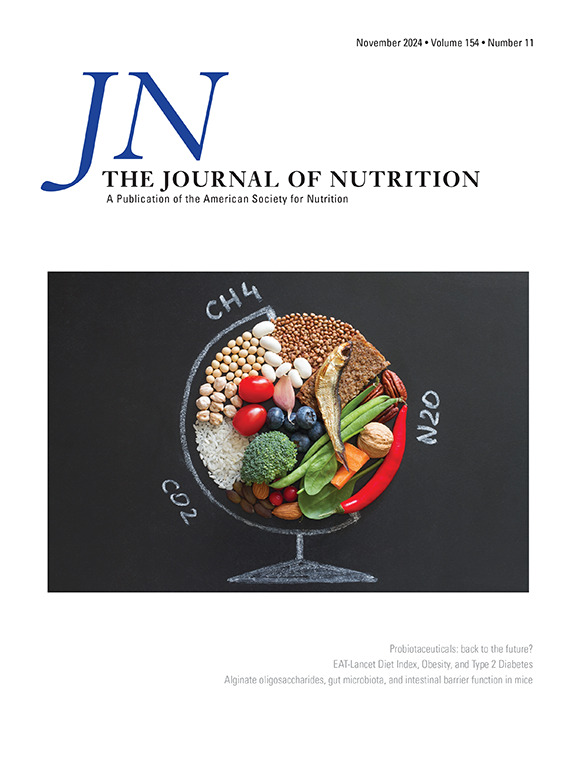经胃输注氘标记胆碱证实,胆碱是妊娠期和哺乳期荷斯坦奶牛的甲基供体。
IF 3.7
3区 医学
Q2 NUTRITION & DIETETICS
引用次数: 0
摘要
背景:在牛中,日粮胆碱以瘤胃保护形式饲喂,以绕过瘤胃降解,同时允许肠道吸收胆碱。我们需要数据来帮助我们确定奶牛从妊娠期过渡到泌乳期的胆碱利用情况:本研究考察了从妊娠期过渡到泌乳期的奶牛体内胆碱甲基转移的情况:六头多胎、瘤胃封堵的荷斯坦奶牛被纳入纵向研究设计中,在预产期前 3 周和产后 2 周,分别从腹腔注入氯化胆碱(CC)进行为期 5 天的实验。每天提供的氯化胆碱中有 20% 被稳定同位素三甲基-d9-氯化胆碱取代。对血浆、乳汁、肝脏、尿液和粪便样本进行了胆碱和胆碱代谢物浓度及同位素富集分析:结果:泌乳期血浆甜菜碱(P < 0.01)、肝脏胆碱和甜菜碱浓度较低(P < 0.01)。泌乳期间,奶牛血液循环中的d3-胆碱、d3-甜菜碱、d9-甜菜碱和d9-磷脂酰胆碱(PC;P≤0.05)富集程度更高,肝脏中的d3-甘油磷酸胆碱和d9-鞘磷脂富集程度更高(P≤0.02)。妊娠期间,尿液和粪便中 d3-和 d9-三甲胺(TMA)以及 d3-和 d9-TMA N-氧化物(TMAO)的流失量增加(P ≤ 0.05)。与哺乳期相比,妊娠期从输注 CC 的尿液中检测到的总胆碱代谢物更高(P < 0.01)。哺乳期与妊娠期相比,输注CC的粪便总胆碱代谢物含量更高(P = 0.03):我们的数据证实,胆碱是一种甲基供体(如检测到的d3-胆碱),胆碱在奶牛妊娠期和哺乳期被胞苷二磷酸胆碱和磷脂酰乙醇胺N-甲基转移酶途径利用。我们还提供了通过胆汁(即存在 d3-TMA)对吸收的胆碱进行内源性再循环的证据。在评估胆碱生物利用率时,必须考虑胆碱降解为 TMA 和 TMAO 的情况:这些发现意义重大,因为这是首次明确证实胆碱是奶牛妊娠晚期和泌乳早期的甲基供体的研究。本文章由计算机程序翻译,如有差异,请以英文原文为准。
Abomasal Infusion of Deuterium-Labeled Choline Confirms that Choline is a Methyl Donor in Gestating and Lactating Holstein Dairy Cattle
Background
In cattle, dietary choline is fed in a rumen-protected form to bypass ruminal degradation while allowing intestinal absorption of choline. We require data to help us define choline utilization in the dairy cow transitioning from gestation to lactation.
Objectives
The study examined choline methyl group transfer in dairy cattle transitioning from gestation to lactation.
Methods
Six multiparous, rumen-cannulated Holstein cows were enrolled in a longitudinal study design where they were abomasally infused with choline chloride (CC) for a 5-d experimental period at −3 wk from the expected due date and again at 2 wk postpartum. Twenty percent of CC provided per day was replaced with the stable-isotope trimethyl-d9-CC. Plasma, milk, liver, urine, and fecal samples were analyzed for choline and choline metabolite concentrations and isotope enrichment.
Results
Plasma betaine (P < 0.01) and liver choline and betaine concentrations were lower during lactation (P < 0.01). During lactation, cows had greater circulating enrichment of d3-choline, d3-betaine, d9-betaine, and d9-phosphatidylcholine (PC; P ≤ 0.05), and greater liver enrichment of d3-glycerophosphorylcholine and d9-sphingomyelin (P ≤ 0.02). Greater urinary and fecal losses of d3- and d9-trimethylamine (TMA), and d3- and d9-TMA N-oxide (TMAO) were observed during pregnancy (P ≤ 0.05). Total choline metabolites detected in urine from infused CC were greater during pregnancy, relative to lactation (P < 0.01). Total fecal choline metabolites from infused CC were greater during lactation than during pregnancy (P = 0.03).
Conclusions
Our data confirm that choline is a methyl donor (e.g., detected d3-choline), and choline is used by both the cytidine diphosphate–choline and phosphatidylethanolamine N-methyl transferase pathways in the cow during gestation and lactation. We also provide evidence for the endogenous recycling of absorbed choline via bile (i.e. presence of d3-TMA). Degradation of choline to TMA and TMAO must be considered when evaluating choline bioavailability.
求助全文
通过发布文献求助,成功后即可免费获取论文全文。
去求助
来源期刊

Journal of Nutrition
医学-营养学
CiteScore
7.60
自引率
4.80%
发文量
260
审稿时长
39 days
期刊介绍:
The Journal of Nutrition (JN/J Nutr) publishes peer-reviewed original research papers covering all aspects of experimental nutrition in humans and other animal species; special articles such as reviews and biographies of prominent nutrition scientists; and issues, opinions, and commentaries on controversial issues in nutrition. Supplements are frequently published to provide extended discussion of topics of special interest.
 求助内容:
求助内容: 应助结果提醒方式:
应助结果提醒方式:


